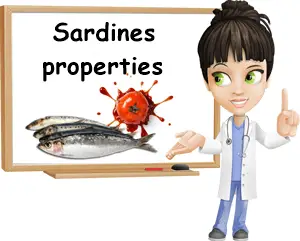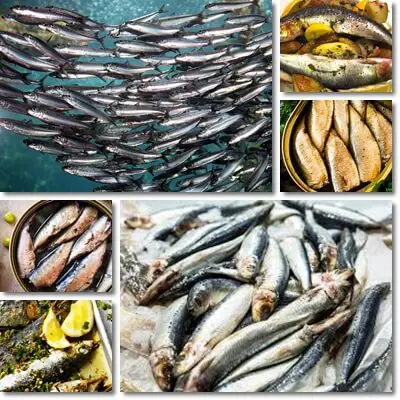Sardines are small oily fish in the herring family with an excellent nutritional value and wonderful health benefits. They are rich in essential Omega-3 fatty acids, B vitamins, particularly vitamin B12, vitamin D, calcium, phosphorus and protein. Eating sardines is good for nervous system health and brain development, digestion and energy metabolism. Their nutritional properties recommend them for strong bones and teeth, better immunity and improved mood as well as building muscle, improving fertility and other benefits.
Sardines nutrition facts.
Sardines are a healthy food of important nutritional value, rivaling iconic fish like salmon in terms of health benefits. Available canned, fresh, salted, dried or smoked, sardines preserve a good nutritional profile and may even acquire further properties with certain preservation methods. The fish may be eaten whole or have their heads removed.
You can even eat canned sardines with bones. Canned sardines which have been cooked and sterilized at high temperatures may have very brittle bones which are as soft as the rest of the meat, allowing for safe consumption and providing important amounts of dietary calcium, phosphorus and magnesium.

Are sardines good or bad for you?
Sardines are actually one of the healthiest and safest fish to eat, even during pregnancy, though in moderate amounts. Typically, sardines are extremely nutritious and low in contaminants like heavy metals. This makes them an ideal choice for most people as they pose the least health risks and promise to deliver significant benefits. However, how you eat sardines is an important factor in determining the health benefits you get to enjoy.
For example, if you have high blood pressure, then it might be wise to avoid canned sardines rich in sodium or smoked sardines which are often salted considerably. If you have high cholesterol, it might be best to avoid sardines canned in vegetable oils to reduce your intake of fats altogether and just enjoy with the fats naturally found in the fish.
See also : Sardines vs Herring
What are the properties and health benefits of sardines?
Sardines are good for you because of the number of essential nutrients they supply to your diet and the benefits that come with these nutrients. Important amounts of vitamin B12, Omega-3 fatty acids, phosphorus and iron, calcium, potassium, magnesium, vitamin D and protein favor good nutrition and are sources of wonderful health benefits. Continue reading to find out the 9 great reasons why you should eat sardines.

Nutrition and health benefits of Sardines
1) Extremely rich in vitamin B12
On average, 100 g of sardines contains 9 mcg (micrograms) of vitamin B12, which accounts for 150% of the minimum recommended daily intake of the nutrient. Vitamin B12 is essential for the formation of red blood cells and helps form the protective coating around the tail of certain nerve cells called the myelin sheath. Eating sardines thus elevates energy levels, improves muscle function, prevents and helps manage anemia, prevents muscle weakness and fatigue, improves mood and brain functions.
2) Overall important source of B vitamins
notably vitamins B1, B2, B3, B6 and B9. Eating sardines improves energy metabolism and supports digestion by regulating the production of digestive enzymes. The fish is an especially good source of niacin, or vitamin B3: 100 g of sardines has around 20-25% of the RDA of niacin. The vitamin is good for brain and nervous system health, helping with insomnia and improving memory, helps digestion and may lower cholesterol and triglyceride levels.
3) Generous source of calcium and phosphorus
On average, 100 g of sardines contains 250-350 mg of calcium and 350-500 mg of phosphorus, both nutrients which make up bones and teeth. Eating sardines helps you achieve better bone density and a lower risk of osteoporosis.
4) Important source of vitamin D
100 g of sardines provides around 25% of the current recommended daily allowance of vitamin D (4.8 mcg of 20 mcg). Having enough vitamin D in your diet regulates bone dissolving and bone formation processes by increasing the absorption of both calcium and phosphorus, two main constituents of bones and teeth. As a result, eating sardines can help increase bone mineral density. A vitamin D deficiency can make osteoporosis worse.
5) Contains both potassium and sodium
Sardines have around 350-400 mg of potassium per 100 g (the RDA is 4.700 mg per day). Potassium is the number one nutrient that lowers blood pressure and, together with magnesium, also found in sardines but in smaller amounts, promotes cardiovascular health. At the same time, sardines tend to have a high sodium content, especially canned sardines and smoked sardines. Sodium content may vary from 200 to 500 mg per 100 g and too high a intake can raise blood pressure and encourage water retention.
Sardines provide small amounts of iron, selenium, zinc, vitamins A and E and contribute to elevated energy levels, muscle health, regulate hormone production, boost immunity, promote good eyesight and have skin benefits.
6) Excellent source of Omega-3
Sardines are a fish species rich in healthy Omega-3 fatty acids, especially DHA and EPA Omega-3. DHA Omega-3 is found in sardines, salmon, mackerel, tuna and other oily fish and is vital for brain and nervous system health, good fertility and cardiovascular benefits. And because they are low in contaminants compared to other fish, sardines are even recommended to pregnant women in moderate amounts to help with brain development of the baby in the womb.
7) Rich in protein
100 g of sardines provides around 20-25 g of protein, a macronutrients that is vital for building and repairing muscle. The amino acids that make up protein are also essential dietary nutrients and help synthesize neurotransmitters that regulate sleep and mood. This is why it has been reported that eating sardines may help combat insomnia and depression.
8) Low risk of mercury contamination
What makes sardines better than mackerel and tuna is their overall low risk of mercury contamination. Sardines are small fish which means they are low on the food chain and may only accumulate small amounts of organic methylmercury from what they eat. Unlike them, bigger fish like mackerel or tuna may accumulate more from eating other fish, posing risks for pregnant women in particular. Sardines are typically safe in moderate amounts (two servings per week or around 6-8 ounces).
9) Lower calories and fat content than other oily fish
Sardines have an average of 200-250 kcal/100 g and 10-20 g of fat/100 g. Considering their good protein content and nutritional value, sardines provide excellent nourishment, varied benefits, especially of nervous system and cardiovascular nature and can help you lose weight in a healthy manner.
